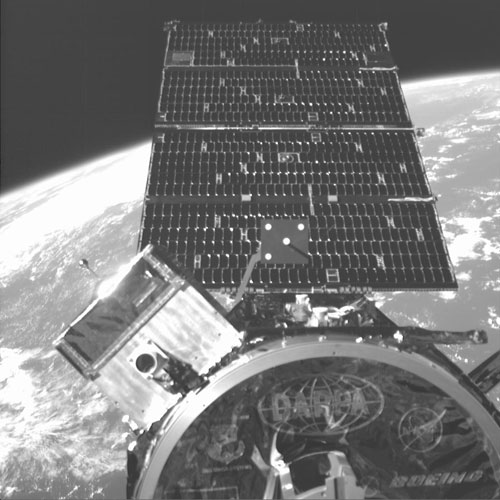DARPA to Decommission Satellite Refueling Prototypes

WASHINGTON- Decommissioning of a pair of experimental Pentagon satellites known asOrbital Express is due to begin today and wrap up two days later, bringing the120-day satellite-refueling demonstration to an irreversible end.
Led by theU.S. Defense Advanced Research Projects Agency (DARPA) with an assist fromNASA, the Orbital Express mission was launchedMarch 8 on an Atlas 5 rocket to show that two specially-built satellitescould link up on orbit and transferfuel and hardware with limited interaction from the ground.
Despitesome early glitches, the mission is considered a success, with thetwo Orbital Express spacecraft completing their final rendezvous and capturemaneuver June 29. It was the second successful grapple of the Ball Aerospace& Technologies-built NextSat by the Boeing-built Autonomous Space TransportRobotic Operations (ASTRO) servicing spacecraft.
In a July 3e-mail, DARPA spokeswoman Jan Walker described the decommissioning process,which she said would get underway after the United States' Independence Dayholiday July 4.
"Thedecommissioning process will consist of de-mating the two satellites,separating them to approximately 1,000 [kilometers] apart, dumping propellantfrom the ASTRO, and then decommissioning the computers," Walker wrote."We expect to de-mate the satellites on 5 July, and decommission the computerson 7 July."
The twosatellites will eventually re-enter the Earth's atmosphere and burn up. NextSat,the lighter of the two satellites, is expected to re-enter in three to fiveyears, according to Walker, while Astro should remain in orbit for another 12to 15 years before coming in.
DARPA andNASA had been quietly lobbying to keep Orbital Express in service a whilelonger to test techniques applicable to future Marssample return missions, according to sources familiar with the situation,but were rebuffed by the U.S. Air Force.
Get the Space.com Newsletter
Breaking space news, the latest updates on rocket launches, skywatching events and more!
A glimpseof the behind-the-scenes jockeying is provided by an e-mail DARPA director TonyTether sent June 29 to nearly two dozen U.S. government officials, includingAir Force Secretary Michael Wynne and NASA Administrator Michael Griffindiscussing the impending deactivation of Orbital Express.
"Itwas hoped that [Orbital Express] would continue for NASA missions. However theAir Force is unable to support any further Orbital Express mission; rationaleunknown at least to me," Tether wrote, "but offers of paying theground station cost for the next three weeks were rejected."
Accordingto sources, three weeks was the amount of time NASA needed to prepare for ahand off of the Orbital Express spacecraft to its flight controllers.
NASAspokesman Dwayne Brown denied any disagreement between NASA and the Air Forceabout ending the mission when speaking to Space News June 29. "There is nodispute," Brown said. "We elected not to pay to do an extendedmission."
- VIDEO: The View from Orbital Express
- VIDEO: A Look at the Orbital Express Mission
- U.S. Air Force to End Orbital Express Mission
Join our Space Forums to keep talking space on the latest missions, night sky and more! And if you have a news tip, correction or comment, let us know at: community@space.com.
Brian Berger is the Editor-in-Chief of SpaceNews, a bi-weekly space industry news magazine, and SpaceNews.com. He joined SpaceNews covering NASA in 1998 and was named Senior Staff Writer in 2004 before becoming Deputy Editor in 2008. Brian's reporting on NASA's 2003 Columbia space shuttle accident and received the Communications Award from the National Space Club Huntsville Chapter in 2019. Brian received a bachelor's degree in magazine production and editing from Ohio University's E.W. Scripps School of Journalism.









